
From the President
It’s been a great year for NJ’s Academic Libraries!
By Elizabeth Leonard
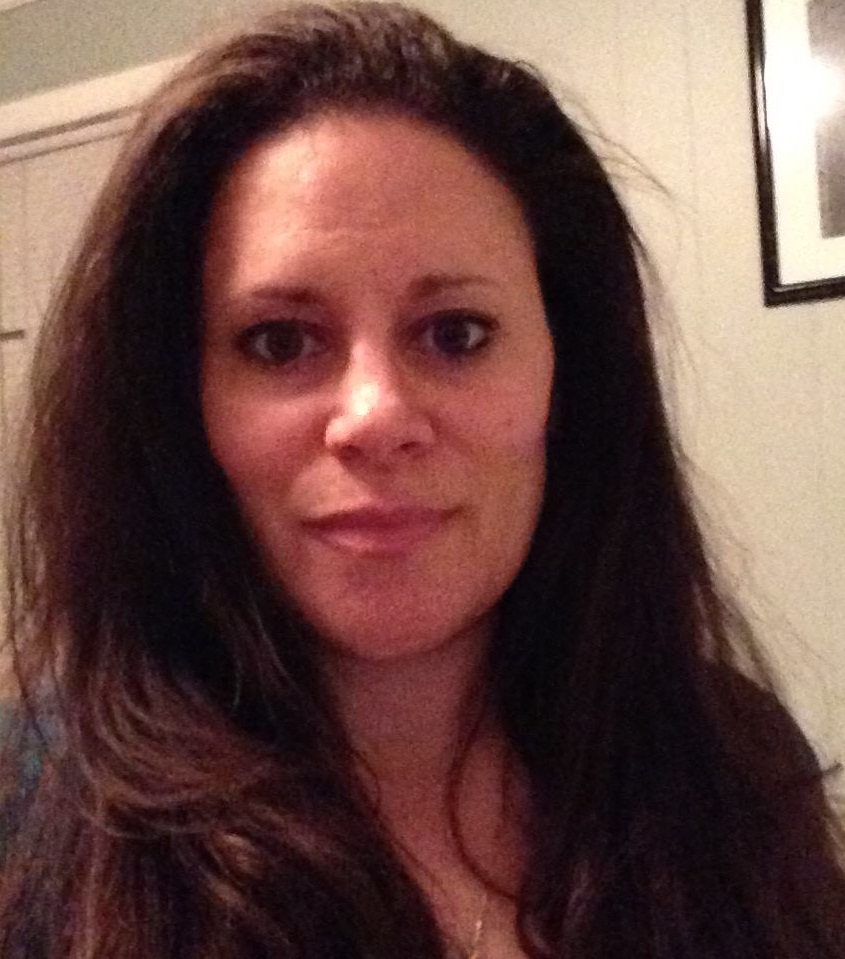
Advocacy/Lobbying: ACRL-NJ teamed up with VALE and NJLA to successfully lobby the Office of the Secretary of Higher Education to keep Information Literacy in the Licensure rules for NJ’s Department of Higher Education. Had this not been successful, it would have begun a slow erosion of the value of IL and libraries throughout the state. I would like (again) to thank VALE and NJLA for their work in addressing this issue.
More Services: We’ve expanded our services to our constituents by welcoming new Committees to ACRL-NJ. Archives & Special Collections, Bibliographic Control and Metadata, and Reference Services joined us after VALE reorganized. We are very happy to offer them a place to continue to do the good work that they’ve done in the past for New Jersey’s Academic Librarians.
Continuing Ed: ACRL-NJ has also provided great seminars and webinars for its librarians. This summer, the User Education Committee Sponsored a Summer Information Literacy Workshop. In the fall, we had two terrific programs- an Executive Board sponsored session in November on Critical Library Pedagogy at FDU, and Research Committee and Elsevier sponsored program at Rutgers-Newark on research, publishing and successful grant writing. This February we had a program on Focus Groups (with a terrific panel) at Rutgers, and in March, a program on Digital Humanities at Seton Hall University. In April, the Archives & Special Collection Committee sponsored a tour of the State Archives and a talk on using rare books as teaching tools.
VALE Conference: And who could forget the ACRL co-sponsored VALE User’s Committee Conference on Jan 15th? It may have been a little later this year due to schedule conflicts with ALA midwinter, but the weather was wonderful and the programs were terrific. Our keynote, Dan Russell from Google, received almost universal acclaim for his engaging and informative talk. Our breakout and poster sessions, centered around our theme, “Library as Locus: Energizing your campus community,” were also appreciated (as was our therapy dog guest). Thank you to all who provided feedback on your experience - it helps us with our kaizen goal to make each Conference better than the previous years’. President-elect Heather Dalal and Conference co-chair Amanda Piekart are already strategizing and planning!
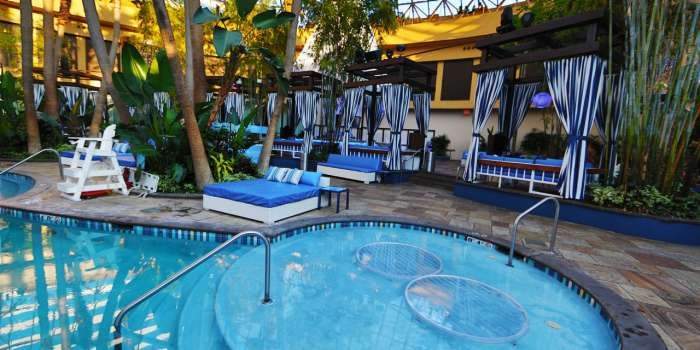 NJLA 2016: Finally, I can’t wait for this year’s NJLA Conference on May 16-18, 2016 at the brand new Harrah’s Conference Center and Resort in Atlantic City. We have worked hard to bring to the conference sessions relevant to academic librarians. We have two pre-conferences on Monday, six programs on Tuesday, and another six on Wednesday. Program subjects range from Special Collections to Technical Services to Reference and Instruction. See the schedule at http://njlaconference.info/schedule. We are very lucky to host CUS luncheon keynote speaker Terry Reese, Head of Digital Library Initiatives at Ohio State University and creator of the MARCedit program. He’ll be speaking about digital libraries at the luncheon on Wednesday and MARCedit earlier that morning. Additionally, at the luncheon we will be honoring our 2016 NJLA Distinguished Service Award winner, Richard Kearney. I hope you will join us in celebrating his hard work for New Jersey’s Academic Libraries. Come for a day, come for the whole time! Register at the website: NJLA Conference.
NJLA 2016: Finally, I can’t wait for this year’s NJLA Conference on May 16-18, 2016 at the brand new Harrah’s Conference Center and Resort in Atlantic City. We have worked hard to bring to the conference sessions relevant to academic librarians. We have two pre-conferences on Monday, six programs on Tuesday, and another six on Wednesday. Program subjects range from Special Collections to Technical Services to Reference and Instruction. See the schedule at http://njlaconference.info/schedule. We are very lucky to host CUS luncheon keynote speaker Terry Reese, Head of Digital Library Initiatives at Ohio State University and creator of the MARCedit program. He’ll be speaking about digital libraries at the luncheon on Wednesday and MARCedit earlier that morning. Additionally, at the luncheon we will be honoring our 2016 NJLA Distinguished Service Award winner, Richard Kearney. I hope you will join us in celebrating his hard work for New Jersey’s Academic Libraries. Come for a day, come for the whole time! Register at the website: NJLA Conference.
2016 Research Award & Forum
By Cynthia Coulter
The Research Committee is very pleased to announce Beth Bloom and Marta Mestrovic Deyrup as winners of the ACRL-NJ/NJLA/CUS Research Award. Ms. Bloom and Ms. Deyrup will speak about their research and recording of undergraduate students’ online research behaviors and corresponding responses during the College and University Section's Research Award & Forum session of the 2016 NJLA Conference. Their publication, “The SHU Research Logs: Student Online Search Behaviors Trans-scripted,” can be found in The Journal of Academic Librarianship 41 (2015) 593-601.
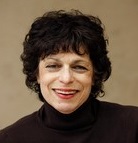
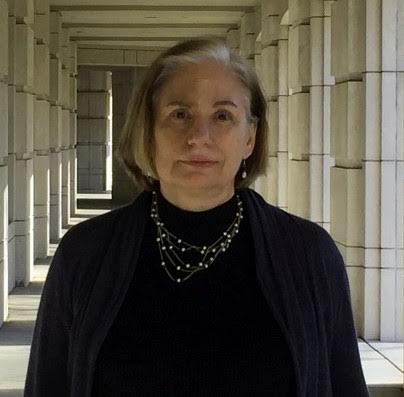 Beth Bloom (left) and Marta Mestrovic Deyrup (right)
Beth Bloom (left) and Marta Mestrovic Deyrup (right)
 In addition, during the Forum session of the presentation, David C. Murray will be discussing his research regarding the use and collection of e-books in the field of Humanities and the resulting scholarly implications. Mr. Murray's title of research is, "E-Books In the Humanities: An Affective Faculty Survey."
In addition, during the Forum session of the presentation, David C. Murray will be discussing his research regarding the use and collection of e-books in the field of Humanities and the resulting scholarly implications. Mr. Murray's title of research is, "E-Books In the Humanities: An Affective Faculty Survey."
The abstracts for both Research presentations can be found below.
The Award & Forum session will be presented during the NJLA Annual Conference at Harrah’s Resort in Atlantic City. Please join us for this evocative event on Wednesday, May 18, 2016 from 2:30pm to 3:20pm in the Wildwood rooms 18 & 19. This year’s NJLA theme is “All Together Now.” Please see the entire NJLA Conference schedule. A registration form can be filled out online.
Title of Publication: The SHU Research Logs: Student Online Search Behaviors Trans-scripted
Abstract: This paper examines students' online research behaviors as well as emotive and affective responses as they conducted online research for their undergraduate courses. It looks at data obtained during the 2011–2012 academic year, drawn from over 42 hours of recordings and includes a brief questionnaire that measured students' research history and feelings about their own research competence.
Title of Research: E-Books In the Humanities: An Affective Faculty Survey
Abstract: Researches have shown that faculty in the humanities are nearly as likely as their sciences and social sciences peers not only to use e-books but also to value them. These studies rest largely though not exclusively on circulation and usage data. Their findings belie a longstanding consensus among librarians who support English, history, and related disciplines that printed monographs remain the format of choice among humanists. Indeed, a gap has opened up between the day-to-day practice of humanities collection development and the findings of several recently published studies. Librarians, therefore, need to understand more about which e-book platforms humanists might be using and why, but as importantly comprehend scholars' attitudes, beliefs, and feelings about the relative value of e-books and printed books in contemporary scholarly communication. A better understanding of humanists' affective preferences could help confirm or refute the validity of claims librarians make about why humanists utilize e-books in the first place. Is it because scholars now genuinely prefer e-books to printed books in most use cases, or rather, as many humanities librarians suspect, is e-book use among humanists better explained by expedience? The presenter proposes to share the results of a 2016 survey designed to address this question.
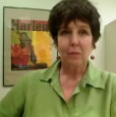 Cynthia J. Coulter is Chair of the ACRL-NJ/NJLA-CUS Research Committee. She is a librarian at Hudson County Community College.
Cynthia J. Coulter is Chair of the ACRL-NJ/NJLA-CUS Research Committee. She is a librarian at Hudson County Community College.
Winner of the NJLA-CUS/ACRL-NJ 2016 Technology Innovation Award
- Christine Davidian and Jonathan Jiras (Rowan University): “Discovering Hacked Accounts with EZProxy Log Analysis”
- Kevin Block, Susan Cavanaugh, Micki McIntyre and Sharon Whitfield (Rowan University): “Rowan Medical Libraries LibGuide Committee”
- Marita Barton Malone and Samantha Kennedy (Rowan University): “Two Nursing Liaisons - One Team - A Collaboration Experience”
Announcements
Berkeley College
Matthew LaBrake, Online Library Director; Amanda Piekart, Information Literacy Instructional Designer; and Bonnie Lafazan, Woodbridge Campus Library Director delivered a pre-conference workshop “Providing Engaging Learning Opportunities in the Online Environment: From Faculty Outreach to Student Success” at the 17th Distance Library Services Conference in Pittsburgh, PA.
Dina Meky joins the Woodbridge Campus at Berkeley College as Instruction/Reference Librarian.
Fairleigh Dickinson University
Nicole Potdevin has joined Fairleigh Dickinson University as a Research & Instruction Librarian on the Florham Campus. Her academic credentials include degrees in Classical Studies from Boston College and Art History & Archaeology from New York University's Institute of Fine Arts. As a trained archaeologist, Nicole has a particular interest in Bronze Age Aegean civilizations.
Ramapo College of New Jersey
Hilary Westgate has joined Ramapo College of New Jersey's George T. Potter Library as Reference and Instruction Librarian, Coordinator of Outreach. Hilary comes to us from her position as Information Literacy Librarian at Misericordia University in Dallas, P.A. Hilary holds her B.A. in English from Ithaca College and her M.L.I.S. from Rutgers University.
Rutgers Center of Alcohol Studies Library
Open libraries (Nyitott könyvtár), a collection of essays and studies by Judit H. Ward, Director of Information Services, was published by Kalligram in Hungarian. The book was launched in April at the National Széchényi Library, Budapest, Hungary. (More about the book in the CAS Information Services Newsletter, p. 10).
Rutgers University Libraries
Kayo Denda, Women's Studies Librarian and Head of the Margery Somers Foster Center, won the Association of College and Research Libraries (ACRL) Women and Gender Studies Section (WGSS) Career Achievement Award.
Adriana Cuervo, Associate Director of The Institute of Jazz Studies, has been appointed to the editorial board of The American Archivist.
Jessica Pellien joined Rutgers University Libraries as Director of Communications in November 2015.
Ricky Camposagrado joined Rutgers University Libraries as a Program Support Specialist in March 2016.
Lila Fredenburg, Director of Administrative Services, retired in February 2016.
Kerry O'Rourke, Director of the Robert Wood Johnson Library of the Health Science, retired in March 2016.
Director of the Paul Robeson Library at Rutgers University-Camden, Gary Golden, will retire in June 2016.
Winner of the 2016 NJLA-CUS/ACRL-NJ Distinguished Service Award
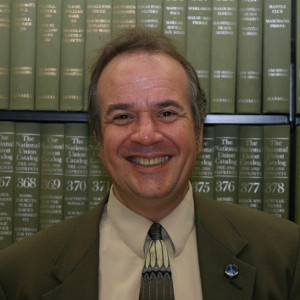
New Jersey Academic Libraries Dominate Computers in Libraries
By Amanda Cowell
I had the opportunity to attend the Computers in Libraries conference March 8th – March 10th in Washington DC. Computers in Libraries is a national conference that highlights and showcases creative and innovative practices in all types of libraries, so it was pleasantly surprising to find so many of the presenters were coming from colleges and universities in New Jersey.
Joseph Deodato, Digital User Services Librarian from Rutgers University, presented twice during the 3-day conference. His first presentation, Deciphering Discovery, discussed how Rutgers University evaluated and selected a discovery tool. His team created an evaluation rubric for discovery tool selection and provided a quantitative formula that could be easily duplicated by other libraries around the country. Joseph’s second presentation, Taming Discovery, discussed what happened after their discovery tool was selected and implemented. He went over the process of evaluating the tool, emphasizing the importance of assessing user needs and collaborative testing. Once again he created a model that was easy for others to follow and duplicate
Sarah Hoskins, Digital Scholarship Librarian, and Aileen Bachant Pritch, Marketing and Outreach Coordinator, both from Rowan University, presented on Evaluating Website Navigation with Usability Tests. Sarah and Aileen explained how they conducted library website usability testing and shared issues they encountered and lessons learned. They stressed the importance in usability testing of distinguishing between navigation discovery and information literacy and the importance of securing valuable student participation.
Cara Berg, a reference librarian and Co-Coordinator of User Education at William Patterson University presented in the Internet@Schools Track. Due to the track designation, most attendees were K-12 librarians, but many academic librarians attended as well. The presentation focused on teaching students to evaluate web content for quality and reliability, and was relevant to anyone who teaches information literacy. (Cara Berg's presentation is presented in detail below.)
The Computers in Libraries was a wonderful conference full of information that I will use to improve the way we do things at my own library. Experiencing the conference with so many fellow New Jersey librarians added a special local feel and made me proud to be coming from a state that was bringing so many new ideas to librarians across the country.
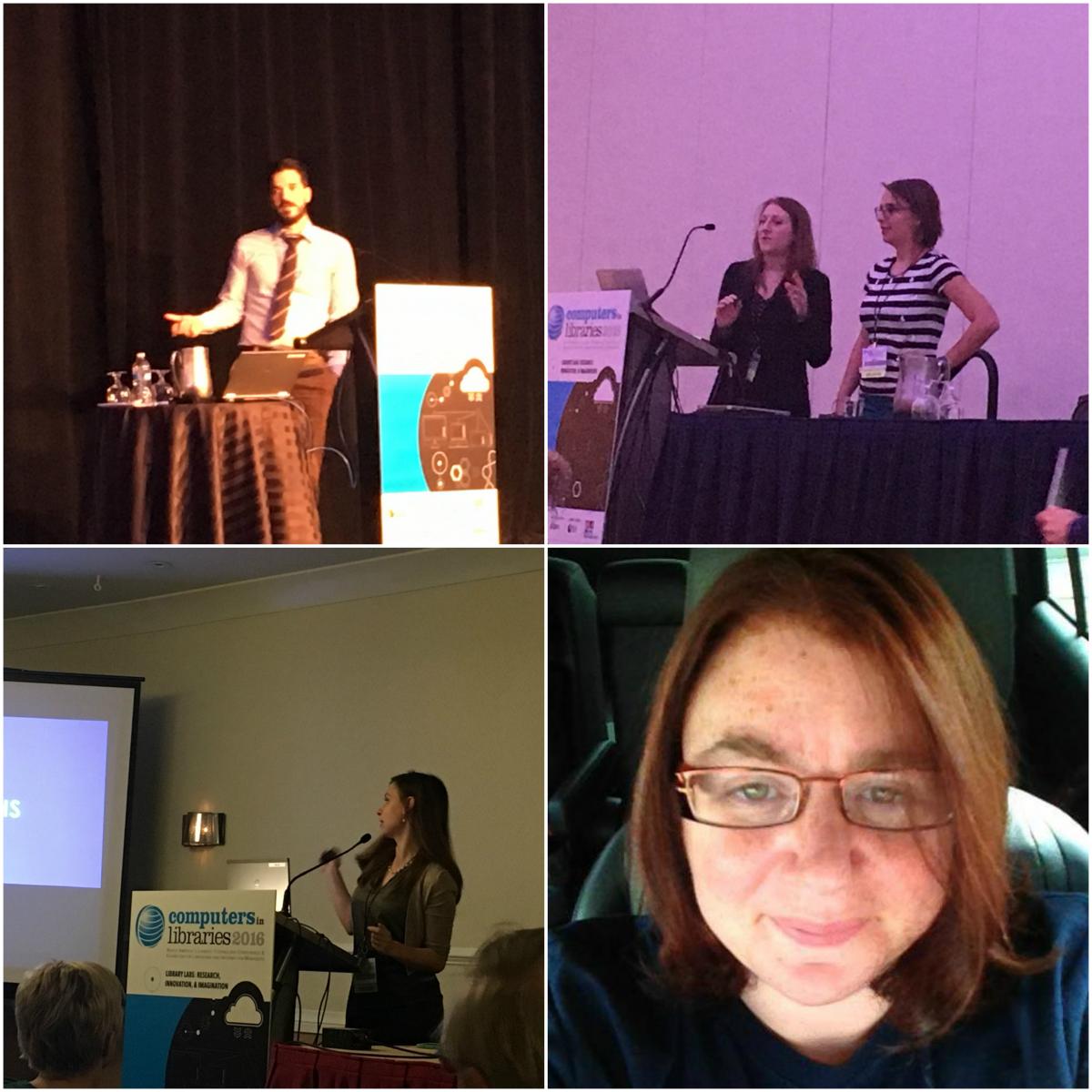
Amanda Cowell is the Emerging Technologies Librarian at The College of New Jersey.
Computers in Libraries: Website Evaluation Instruction for First Year Students
By Cara Berg
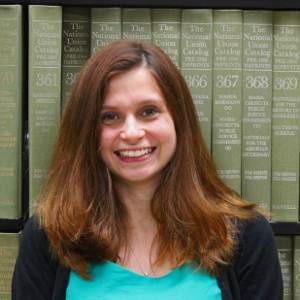
I presented at the Computers in Libraries Conference in March 2016. My presentation covered website evaluation in First Year Seminar (FYS) information literacy instruction. Below is a brief synopsis:
At the Cheng Library at William Paterson University, librarians instruct website evaluation in FYS classes as part of an overall orientation to the library. Other pieces to FYS instruction include using the discovery layer to find books and articles as well as an exercise in creating keywords. The students are not working on a research project for their FYS class, so we designed our own in-class assignment. To teach website evaluation, we use the CRAAP method (Currency, Relevance, Authority, Accuracy, Purpose) as the backbone of our instruction. In years past, there were some issues with instructing website evaluation. Librarians needed to cover a lot in a one-shot session, and as the last piece, the website evaluation portion was frequently rushed through or skipped altogether. In addition, students were given the website evaluation piece as a lecture and, on the in-class assignment, asked if they would recommend a website or not using the CRAAP method. Student responses to this generally were not very thorough or missed the assignment point altogether.
This past fall, we introduced changes to provide a more complete approach to website evaluation. First, the in-class assignment piece was expanded; each facet of the CRAAP method has a corresponding question for the students to evaluate with instead of the one, general, “Evaluate this website using the CRAAP method”. It was recommended that the lecture be “chunked”; broken up into individual pieces that would correspond with the assignment. The librarian would demonstrate Currency and Relevance, and then the student would go to their assignment and fill out the corresponding pieces. Then the librarian would demonstrate the next two, and so on. Finally, the lecture itself was supported with a visual aid of a web article that students can apply to everyday life. To fix the timing issue, we implemented a flipped classroom model for the discovery layer piece, which freed up time to handle the website evaluation piece. In reviewing the results from the in-class assignment, results are positive and show a much stronger and more thorough understanding of website evaluation. In addition, students were given an optional post-test 1-2 months after their instruction session where the results were generally positive as well.
Going forward, we’re looking into possibly inserting a collaborative learning piece for website evaluation. One of the spring FYS classes was piloted where students broke up into groups and each group evaluated a website using the CRAAP method, then reported on their conclusions back to the class. Informal feedback has been positive. As has been done in years past, we will be evaluating over the summer to be prepared for our new incoming first year students in the fall.
Cara Berg is Co-Chair of the ACRL-NJ/NJLA-CUS User Education Committee. She is a Reference Librarian/Co-Coordinator of User Education at William Paterson University, and can be reached at bergc1@wpunj.edu.
Collaboration Between Students and Librarians at Rutgers University Brings Unique History of New Jersey’s Seabrook Farms
By Jessica Pellien
Rutgers University graduate and undergraduate students in the course, “Public Histories of Detention and Mass Incarceration,” spent the fall 2015 semester working on an in-depth online exhibition, “Invisible Restraints: Life and Labor at Seabrook Farms,” which will be hosted by the New Jersey Digital Highway.
”Invisible Restraints: Life and Labor at Seabrook Farms” explores the farm's layered histories, in particular, the wartime relationship between captive labor and capitalism that defined Seabrook. World War II created new opportunities for Seabrook to procure laborers with limited options who existed in varying states of confinement. This included approximately 2500 American citizens and immigrants of Japanese descent incarcerated by Executive Order 9066 and considered national security threats due to their ancestry, despite never being charged with any crime.
Working with Rutgers University librarians and staff, the students learned principles and practices of exhibition curation that apply to both physical and digital exhibitions, including identifying and organizing items in an exhibition, navigating rights and permissions processes, using metadata to manage online resources, and curating digital data. They also made use of the considerable resources and capabilities of RUcore, the Rutgers University Community Repository, both to conduct research and to mount a digital exhibition.
“The students used Seabrook resources from the New Jersey Digital Highway, as well as resources from the National Archives, primary source material from Rutgers University Libraries, and other sources,” explains Kayo Denda, women's studies librarian at Rutgers University Libraries. “It has been gratifying to deeply engage with the materials and students and we are very grateful to Andy for the opportunity to work with his class.”
Andrew Urban, professor of American Studies, agrees with Denda’s assessment: “This project represents a unique collaboration between classroom learning and the Libraries, and shows what can be accomplished when various resources are working together in concert. The exhibit that we have created will be a lasting resource for students and members of the public around New Jersey, the country, and even the world.”
Explore the exhibit here: http://www.njdigitalhighway.org/exhibits/seabrook_farms/
Jessica Pellien is Director of Communications at Rutgers University Libraries.
New Study and Collaboration Spaces at Keith & Shirley Campbell Library
By Aileen Bachant Pritch
Last year, Rowan University’s Keith and Shirley Campbell Library completed a series of projects on the second floor of the six-story library building to meet students’ requests for more functional study and collaboration spaces. Identified spaces had formerly housed only reference materials, but now offer so much more.
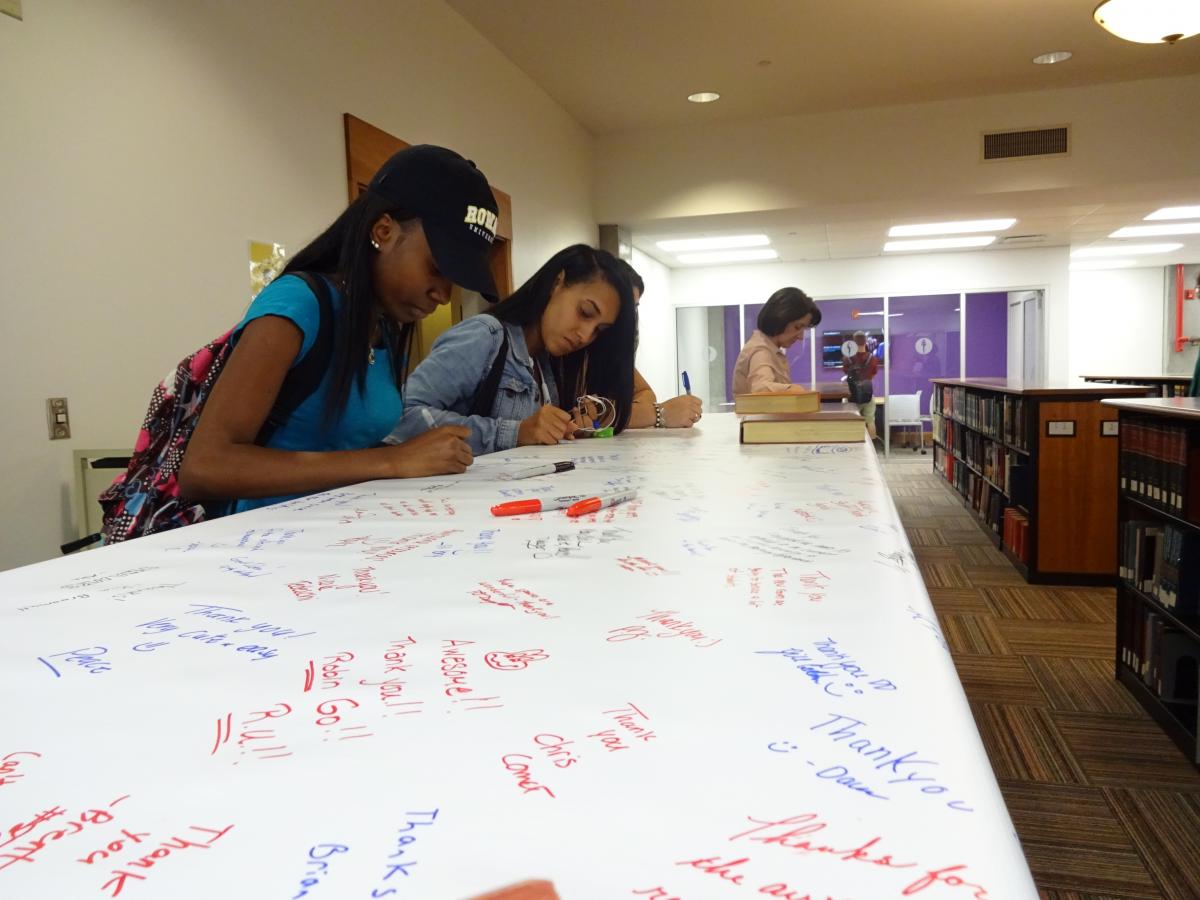
Feedback to inform renovation projects was collected on easels throughout the Library asking, “What do you want in this space?” Library administrators met with the Student Government Association to review student comments about library resources and services, as well as the Student Facilities Committee to discuss campus accommodations for technology and resource access. And, Library staff observed space usage in different areas from opening until closing time to discover which spaces were popular for study and research needs.
Based on collected information, reference librarians chose appropriate tables, work spaces and lighting, and removed unnecessary shelving to maximize available floor space and increase seating capacity.
In completing the projects on the second floor reference reading area, students have gained and are frequently using 16 new computer stations, 70 individual seats, and four collaboration rooms.
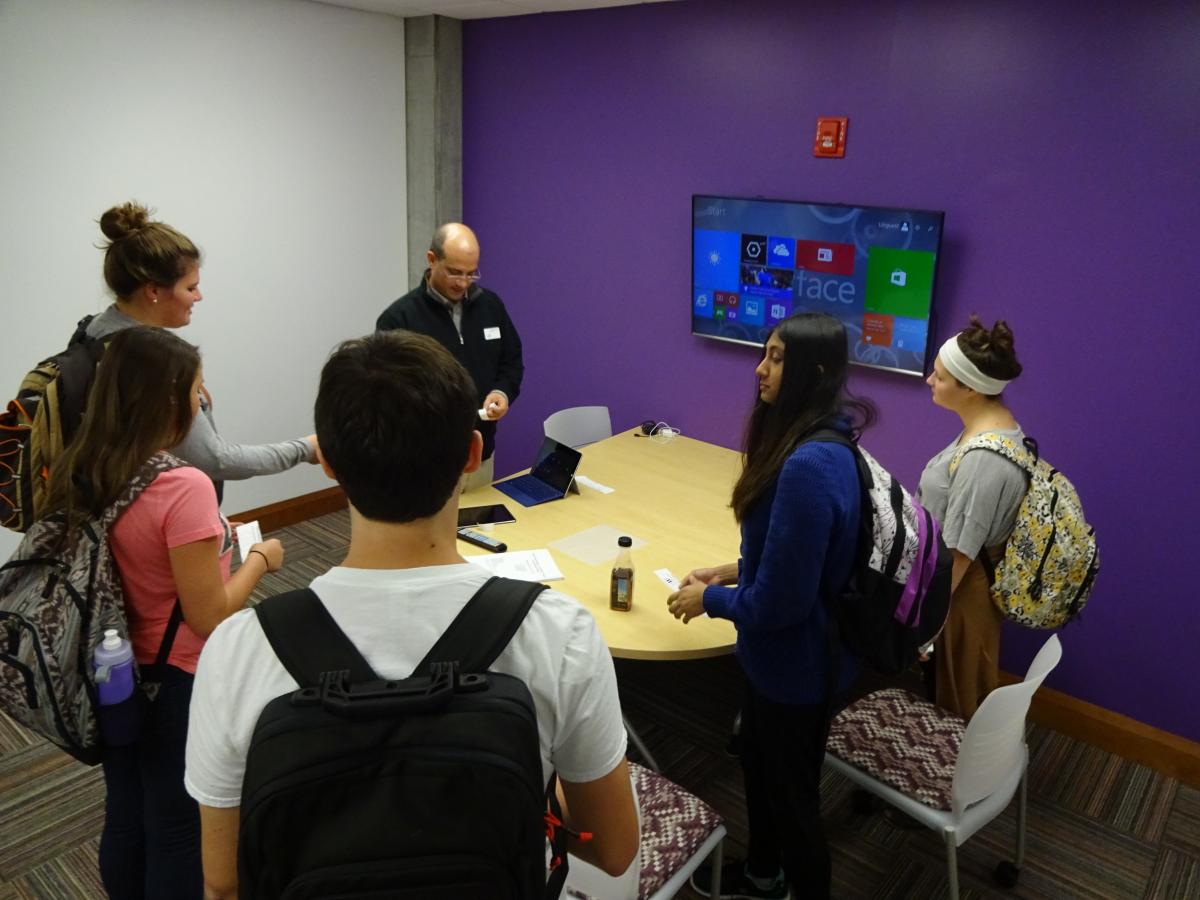
More than 250 students and staff attended an all-day opening event on October 8th and actively tested and explored the capabilities of newly installed presentation hardware and software in the four new collaboration rooms. The Miracast and AppleTV display technologies, as well as the monitors themselves, are currently being evaluated in partnership with Rowan University’s IT department for installation in the highly anticipated new homes for the Colleges of Business and Engineering.
Additional projects have been scheduled for this summer to address lighting and power source needs, and modification of physical service points. Projects are specifically slated to address accessibility and ADA issues, and improve the overall quality of service for visiting Rowan University community members seeking research assistance.
Aileen Bachant Pritch is Marketing and Outreach Coordinator at Rowan University Libraries.
Ramapo's Year of Latin America Book Club Collaboration
By Katie Maricic Cohen
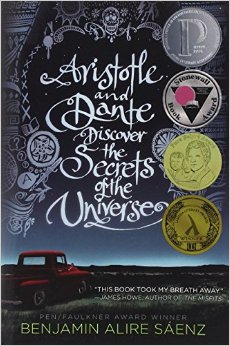 This year, Ramapo College of New Jersey’s George T. Potter Library collaborated with the college’s Roukema Center for International Education to create a fun and meaningful Year of Latin America Book Club. The collaboration was a very rewarding experience which resulted in new bonds between faculty, staff and students. This article describes the history of the club, the book selection process, the club’s format, funding, promotion of the club, and outcomes.
This year, Ramapo College of New Jersey’s George T. Potter Library collaborated with the college’s Roukema Center for International Education to create a fun and meaningful Year of Latin America Book Club. The collaboration was a very rewarding experience which resulted in new bonds between faculty, staff and students. This article describes the history of the club, the book selection process, the club’s format, funding, promotion of the club, and outcomes.
This partnership started last year when my colleague Sam Wittenberg and I were asked to be on the International Education Committee. The Committee was planning a new effort in which each academic year would be focused on a different area of the world. The 2015-2016 year would be the Year of Latin America, and the Committee needed help brainstorming ideas for events and programs. It was clear to us librarians that a book club would be a perfect addition to the activities celebrating this region.
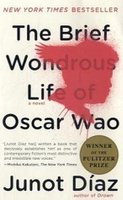 Sam and I decided that the book club would read one Latin American-focused book per semester. Selecting books took time because there are a lot of great options about Latin American cultures or by Latino/a authors. We consulted faculty specializing in Latin America, and considered our busy student audience and decided on two novels which were not too long or difficult to read (One Hundred Years of Solitude seemed too daunting for students who had a lot of other required readings!). For the Fall, we selected Aristotle and Dante Discover the Secrets of the Universe by Benjamin Alire Sáenz, a coming-of-age story about two young Mexican-American boys. In the Spring we read The Brief Wondrous Life of Oscar Wao by Junot Diaz, a story of the hopes and dreams of the titular Oscar, a Dominican-American living in New Jersey.
Sam and I decided that the book club would read one Latin American-focused book per semester. Selecting books took time because there are a lot of great options about Latin American cultures or by Latino/a authors. We consulted faculty specializing in Latin America, and considered our busy student audience and decided on two novels which were not too long or difficult to read (One Hundred Years of Solitude seemed too daunting for students who had a lot of other required readings!). For the Fall, we selected Aristotle and Dante Discover the Secrets of the Universe by Benjamin Alire Sáenz, a coming-of-age story about two young Mexican-American boys. In the Spring we read The Brief Wondrous Life of Oscar Wao by Junot Diaz, a story of the hopes and dreams of the titular Oscar, a Dominican-American living in New Jersey.
From the Newsletter Archives
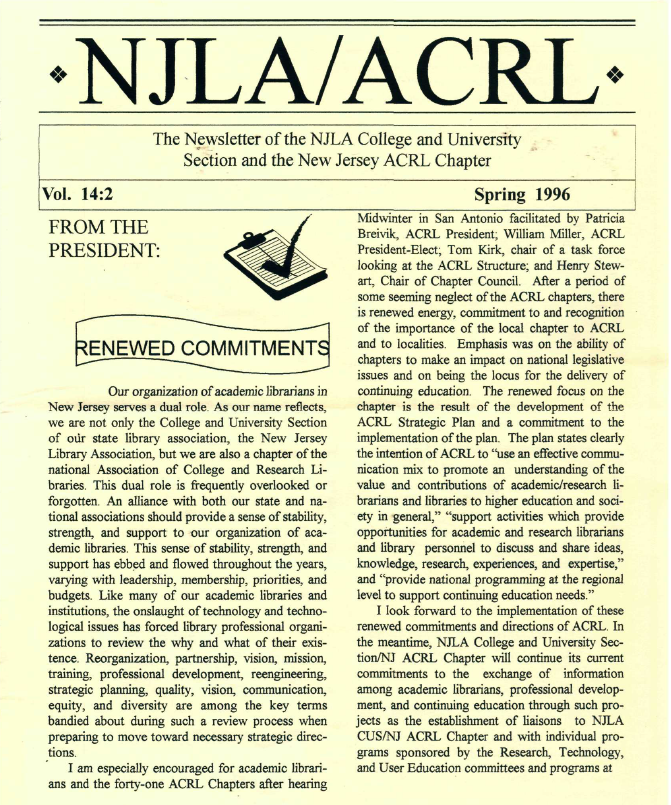 Spring 1996. . . what was going on 20 years ago in NJLA/ACRL? Please take a few minutes to peruse our throwback issue of the NJLA/ACRL Newsletter. When discussing the dual role of what we now know as NJLA-CUS/ACRL-NJ, then president, Jeris Cassel, notes, "This dual role is frequently overlooked or forgotten. An alliance with both our state and national associations should provide a sense of stability, strength, and support to our organization of academic libraries." Those words still hold true, 20 years later. We hope you have fun reading familiar names in "Focus on People" and "Around the State."
Spring 1996. . . what was going on 20 years ago in NJLA/ACRL? Please take a few minutes to peruse our throwback issue of the NJLA/ACRL Newsletter. When discussing the dual role of what we now know as NJLA-CUS/ACRL-NJ, then president, Jeris Cassel, notes, "This dual role is frequently overlooked or forgotten. An alliance with both our state and national associations should provide a sense of stability, strength, and support to our organization of academic libraries." Those words still hold true, 20 years later. We hope you have fun reading familiar names in "Focus on People" and "Around the State."
Fair Use Tools for Librarians
By Sharon Whitfield
I have a love/hate relationship with copyright law. As CMSRU’s copyright expert, I have often helped to decide whether we are complying with license agreements and copyright law. In education, we consider the fair use factors of:
- the purpose and character of your use
- the nature of the copyrighted work
- the amount and substantiality of the portion taken, and
- the effect of the use upon the potential market.
Yet, applying the fair use factors is difficult, which is why I am providing resources that I have found beneficial:
Copyright Fair Use Index
The Copyright Fair Use Index is a great site to gauge how the courts decide fair use cases. You can select jurisdiction, but I find that I use category search to see how the courts are deciding digitization or formatting cases.
The Fair Use index may be accessed at: http://copyright.gov/fair-use/fair-index.html.
Copyright Search Records
If you are beginning a formatting or digitization project, the copyright search records website can be your best friend. This site is also my first stop when considering a fair use claim for any work pre-1978. Before I even begin the fair use analysis, I perform a pre-1978 record search to ascertain if the work had been renewed. If it wasn’t renewed, the material is now available to the public.
The Copyright Search may be accessed at: http://www.copyright.gov/records/
Fair Use Evaluator
While I don’t think the fair use evaluator is perfect, I do think it helps to make the “no decision” for fair use cases. I also think it is a great teaching tool for students who are just beginning to understand fair use.
The Fair Use Evaluator may be accessed at: http://librarycopyright.net/resources/fairuse/
College or University website
Before advising someone that fair use may be applied, consider consulting your college or university website for fair use guidance. Each college or university’s legal counsel should have a stance on how liberal the fair use application should be. Knowing their stance on fair use can help to advise the willingness of your college or university to litigate copyright cases.
Sharon Whitfield is the Emerging Technologies Librarian at Rown University.
Editors
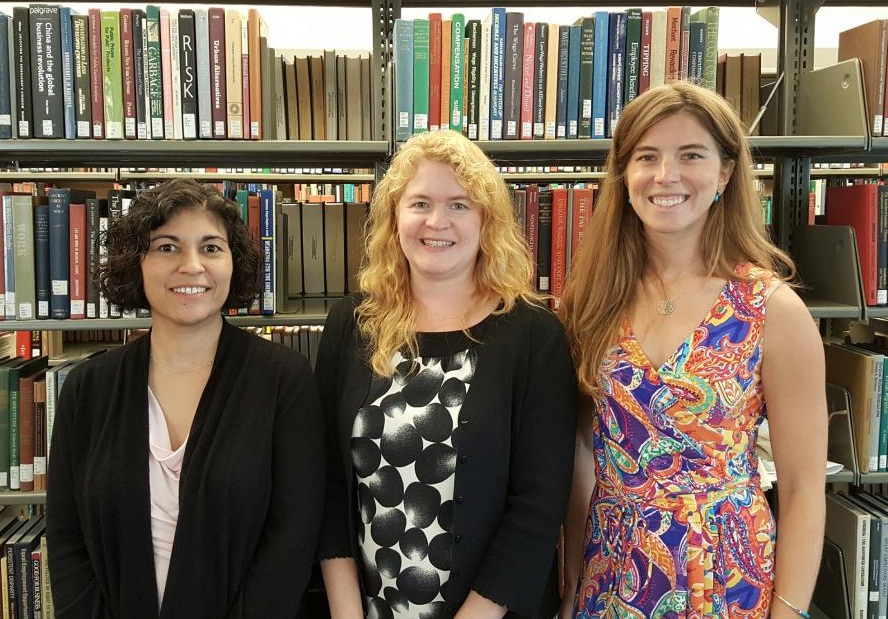 The CUS/ACRL-NJ Newsletter is edited by Joan Dalrymple, Access Services Librarian at Bergen Community College; Katie Maricic Cohen, Interlibrary Loan, Reference and Instruction Librarian at Ramapo College of New Jersey; and Rebecca Sloat, Distributed Technical Services Coordinator/Serials Team Leader at Rutgers University.
The CUS/ACRL-NJ Newsletter is edited by Joan Dalrymple, Access Services Librarian at Bergen Community College; Katie Maricic Cohen, Interlibrary Loan, Reference and Instruction Librarian at Ramapo College of New Jersey; and Rebecca Sloat, Distributed Technical Services Coordinator/Serials Team Leader at Rutgers University.
Editors Rebecca Sloat, Joan Dalrymple and Katie Cohen pose for a picture during the Summer 2015 Marketing and Communications Committee Meeting at Monmouth University Library.
